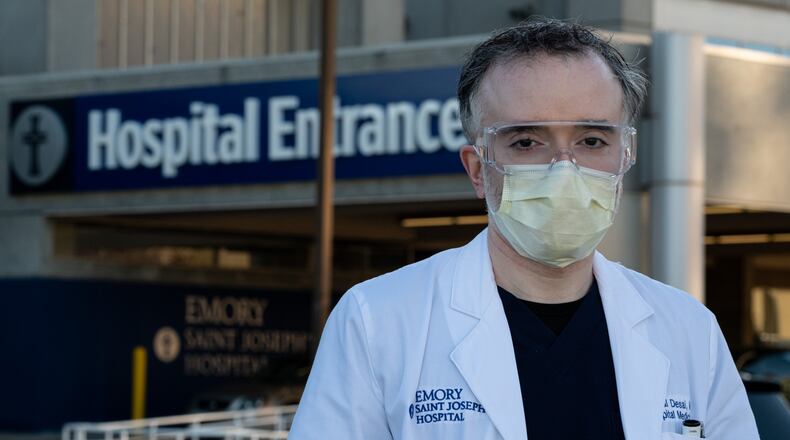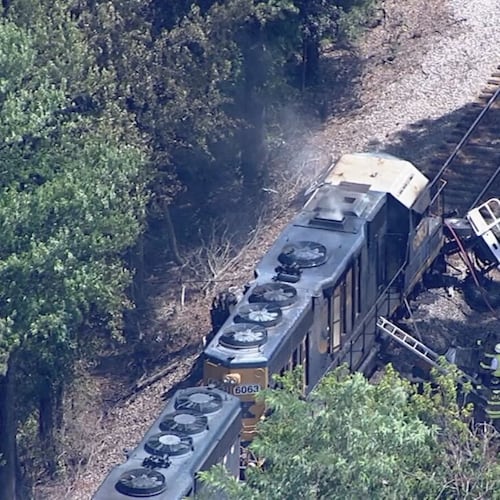Early in the pandemic, the country paused to clap for health care workers as they left their shifts.
People scrawled encouraging messages for them on the sidewalks outside of hospitals, serenaded them with songs, sent cards, dropped off plates of food.
Those on the medical frontline were working long hours under dangerous conditions, but the newly minted heroes held out hope that, if they could weather the surges, fellow Americans would do their part to stem the tide of cases.
Now, as health workers face the latest infection surge, it’s starting to wear on them. Looking out over the landscape, this is what they see:
Millions of Americans planning holiday gatherings that could lead to more infections and deaths. Advice to wear masks and socially distance routinely ignored by many who regard it as a political ploy. A Georgia Congresswoman-elect actively mocking the measures in public statements. Doctors accused of faking COVID-19 diagnoses for profit. Twitter and Facebook teeming with posts that deny the reality of what health care professionals deal with on a regular basis — holding ipads up to dying patients so their loved ones can say goodbye.
“It makes me shake with anger,” said Dr. Jason Stein, who works in COVID-19 wards in hospitals in Atlanta and Charleston. At this point, he’s not nearly as afraid of contracting the virus at work because he and colleagues believe they know how to control it. And, he said, there’s no reason that the public shouldn’t be doing a better job of stopping the spread.
“It’s all entirely manageable,” Stein said. “We know the contours of how to manage it. What makes me angry is the willful disregard for managing this well.”
“You’ve got just wave after wave after wave of people coming into your emergency department” with COVID-19, added Dr. Joy Maxey, an Atlanta board member of the Physicians Foundation, a nonprofit that provides support to doctors.
“And you’re overwhelmed with the numbers and the volumes. And you are putting yourself on the line to care for these people. And you yourself, as a physician, you have a family. ... You have people that you love and care about and that love and care about you.
“It’s incredibly frustrating that people can’t follow the basic science that’s out there — that says, look, masks, plus social distancing, plus fewer numbers of people gathering, equal less cases.”
Credit: Ben Gray
Credit: Ben Gray
A growing toll
Dr. Dhaval Desai said that, early in the pandemic, he found it energizing taking care of patients fighting COVID-19.
It was a terrifying, but also thrilling time to learn about a new virus, he said. Information was constantly changing.
There was no off-button for the unflappable doctor. Even when home, he was glued to his computer and phone, staying abreast of any new development on how to best care for a COVID-19 patient.
“I felt tired, but I was reassured by the thought that I was doing important work, and I was part of history in the making,” said Desai, who is Emory Saint Joseph’s director of hospital medicine.
After a summertime surge, Desai felt like the worst of the pandemic was over. It turns out, it wasn’t. Experts fear the worst is yet to come.
In a September survey by the Physicians Foundation, 78% of physicians rated people’s lack of compliance with mask-wearing and social distancing as their top frustration during the pandemic. It ranked higher than frustration with lack of reliable testing.
“It feels different now,” said Desai. “It doesn’t feel as exhilarating or exciting. The adrenaline is gone. I think it’s a disillusionment phase we are in.”
COVID-19 is no longer a total mystery. Health care workers have learned a great deal about the virus and have made strides in treating patients. A vaccine is on the way, but not in time for the coming surge.
The numbers in Georgia have steadily increased over the past several weeks. Nearly 82% of ICU beds are full, according to the latest figures from the Georgia Department of Public Health.
Hospitals have launched various programs to help health care professionals deal with the emotions brought on by the pandemic, but also to give them avenues to express concerns about safety and possible exposure to the disease and to help with back-up child care assistance.
Maxey’s group, the Foundation, recently surveyed physicians on their experiences in the pandemic.
The survey found that, as a result of the pandemic, 58% of doctors reported feeling burned out, compared to 40% in 2018, and 8% said they had considered self-harm.
And there’s a suite of other stressors — everything from concerns about furloughs and staffing shortages to whether there will be enough personal protective equipment to help keep them safe.
“Nobody knows how stressful it is to care for a COVID-19 patient until you don PPE and care for a COVID-19 patient,” said Desai. “Every time I enter that room, I feel that stress.”
‘We can change the outcome'
Dr. Nailah Abdulbaaqee, who is a primary doctor with One Medical, a primary care practice with offices in Atlanta and across the country, can only shake her head when she sees dinner parties, sleepovers and maskless get-togethers.
“Somehow the number of deaths hasn’t translated into an overall sense of responsibility that we should have toward each other,” she said.
Sure, doctors say they see patients act carelessly or make poor decisions all the time, such as diabetics who won’t change their diets, or the patient with high blood pressure who skips taking prescribed medication. But, they say, not following recommendations to prevent the spread of the coronavirus impacts not only the patient but everyone around him or her.
“The thing with COVID is, it’s like a tsunami. I mean the number of patients is like an absolute tsunami, and it’s overwhelming,” said Maxey.
Abdulbaaqee said she holds onto the faith that people have the capacity to change, though that too often comes after the virus hits home and either they or someone close to them gets sick.
“People can underestimate the role of health in their lives, and you don’t understand the true meaning of health in your life until you don’t have it. I don’t want people to have an adverse reaction to appreciate life,” she said.
“I hurt for the most vulnerable, the ones who don’t have the resources or capacity to combat the virus,” she said. “People who are getting chemotherapy or are immunocompromised, the people who are in nursing homes, foster care, our babies. The truth is we are all intermixing, and we are all one, and the vulnerabilities are in all of us, even if we choose not to recognize it.”
Meanwhile, Desai recently took a 10-day respite. He spent quality time with his newborn and with his 4-year-old daughter who was learning to ride a bike. When he returned to work, he was warmly received with colleagues holding posters and cheering his return. He makes a concerted effort to check in and decompress with his colleagues.
“I try to remind myself, at the end of the day, this is my job, and I can’t let it consume my entire life.”
He also clings to hope that the coming months will be better than he fears.
“If everyone comes together and we protect ourselves by masking, socially distancing and following community guidelines, we can change the outcome,” he said.
Keep Reading
The Latest
Featured




